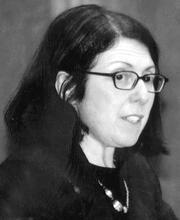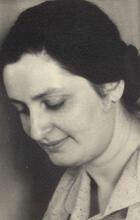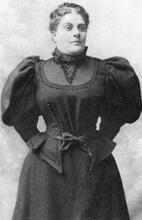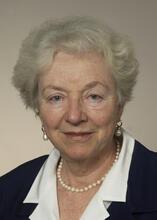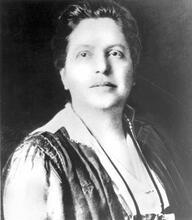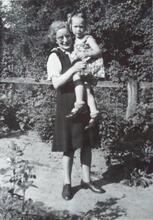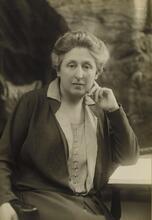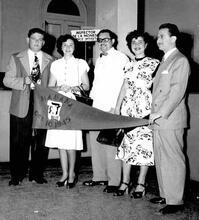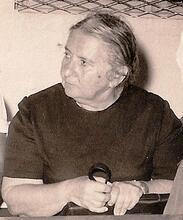Dorothy C. Kahn
During the Great Depression, Dorothy C. Kahn helped pioneer social work as a service provided by the government to all who needed it. Kahn led countless organizations, including the Hebrew Benevolent Association of Baltimore, the Jewish Welfare Society of Philadelphia, and the American Association of Social Workers, and chaired the employment subcommittee for Franklin Delano Roosevelt’s Commission on Economic Security. During World War II, Kahn directed the Economic Adjustment and Family Services at the National Refugee Service, after which she led the Health and Welfare Council of New York City. Finally, she was chief of the Social Welfare Division of the Department of Social Affairs for the UN, working to create a safety net of social services across the world.
Dorothy C. Kahn, an outstanding social worker, lived through the Depression and World War II, major crises of her generation and the twentieth century. Through her innovative administrative capacity, she developed, implemented, and advocated for social welfare programs and policies whose underlying principles upheld her deepest beliefs about what social welfare could mean in a democracy.
Early life, education, and career
Dorothy Kahn was the eldest of three children born to Julius and Viola (Cohen) Kahn of Seattle, Washington. Her mother was the daughter of a famous rabbi, and her father was an innovative and successful businessman. When Kahn was a young girl, the family moved to Chicago. She returned to Chicago after graduating from Wellesley College in 1915. Inspired by her family friend Frances Tausig, executive head of the Jewish Family Agency, she decided to pursue a career in social work. She became a case worker at that agency from 1915 to 1918, attended the University of Chicago School of Social Work, and then was civic director of Chicago Women’s Aid from 1918 to 1919.
Kahn demonstrated both talent and interest in administrative work and, at twenty-six, was offered the job of superintendent of the Hebrew Benevolent Association of Baltimore. In this position (1919–1928) and then as director of the Jewish Welfare Society of Philadelphia (1928–1932), Kahn developed innovative programs that challenged the traditional view of social work. She thought that social work, like education, should be publicly supported, universal, and available to all citizens.
The Great Depression
The 1930s brought the Depression and widespread unemployment. When it became apparent that only public agencies could deal with the vast economic problems, the responsibility for the transfer of relief shifted from private to public organizations. In 1932, Kahn became the first executive director of the Philadelphia County Relief Board. In developing and administering programs for relief, Kahn upheld democratic principles. She believed that people were in need through no fault of their own, and that every citizen had the right to a minimum standard of living as a matter of human rights and social justice, not charity. Kahn urged social workers and the social work profession to take leadership roles in developing and building an adequate national system for social welfare. From 1934 to 1936, she was president of the American Association of Social Workers. In 1936, she convened and gave a keynote address at the national conference that focused on relief, and the same year she reported on relief practices in America at the International Conference of Social Workers. Kahn chaired the subcommittee on employment and relief of President Roosevelt’s Commission on Economic Security.
During these years in Philadelphia (1930–1945), she had close associations with the University of Pennsylvania School of Social Work. She filled students with her social philosophy as she taught courses in administration and trained students to implement social welfare programs and policies. Citizens in Philadelphia and across the country protested in 1938 when, amid controversy, Dorothy Kahn was fired as executive officer by the local board. Her dismissal was a tremendous loss for Philadelphia, but it gave impetus to a movement to clarify standards for civil service employment and provide protection for workers.
Kahn left Philadelphia to become staff executive secretary and then staff president of the American Association of Social Workers. In these positions, she developed professional standards for public welfare workers and helped the social work profession define its role in the development of social policy and social welfare programs access the country.
From domestic to internationally focused work
From 1941 to 1943, she focused on the relief of refugees. She served as director of Economic Adjustment and Family Services at the National Refugee Service in New York. After World War II, she became the executive director of the Health and Welfare Council of New York City from 1945 to 1950 and concentrated on issues of adoption, the needs of the elderly, and the plight of recently immigrated Puerto Ricans.
From 1951 to 1954, Kahn was chief of the Social Welfare Division of the Department of Social Affairs of the United Nations. She directed her energies to meeting the challenge of worldwide social needs and raising the general level of human rights and welfare on a global level. She represented the UN at conferences on social work and child welfare in India, and advised the Israeli government on social welfare legislation.
After retiring from the UN in 1954, she returned to Hickory Farm, her summer home in New Hope, Pennsylvania. When Hurricane Diana hit the region in August 1955, bringing floods and dislocation, she organized emergency relief for the community. A few days later, on August 26, 1955, Dorothy C. Kahn died at home of a heart attack.
Kahn, an extraordinary woman, grappled with the major social problems of her day. Through social work programs and policies, she responded to the unmet human needs of her time. Underlying her life’s work and articulated in her writings was a core of deeply held values that guided her. She viewed human need as part of the human condition and thought—as a matter of social justice—that society should find ways through its democratic institutions to meet those needs. She also believed that society should inculcate in all its citizens a sense of social responsibility and offer them the freedom to live productive and autonomous lives.
Selected works by Dorothy C. Khan
“The Challenge of World Wide Need.” Journal of Social Work Process 6 (1955): 1–14.
“Democratic Principles in Public Assistance.” Proceedings in the National Conference of Social Work: Selected Papers of the Sixty-Sixth Annual Conference of Social Work (June 1939): 18–24.
“Experiment in Selective Intake in a Family Society.” The Family 13, no. 1 (March 1932): 3–8.
“The Future of Family Social Work.” The Family 9 (1928): 185–188.
“The International Aspects of the Problem of the Unemployed in Relation to the Community.” Proceedings from the Third International Conference of Social Work (1936): 537–545.
“Problems in the Administration of Relief.” The Annals of the American Academy of Political and Social Science 176 (November 1934): 40–48.
“This Business of Relief: The Occasion for the Conference.” Proceedings from the 1936 Conference of the American Association of Social Workers (1936): 7–14.
“The Use of Cash, Orders for Goods, or Relief in Kind in a Mass Program.” The Family 14 (October 1933): 198–202.
“What is Worth Saving in ‘This Business of Relief.’” Survey Journal of Social Work 73 (February 1937): 38–39.
AJYB 58:477.
EJ; Guler, Alvin. “She Failed to ‘Cooperate.’” The Compass (October 1938) 3–23.
Obituaries. The Journal of Social Work Process 6 (1955): 5–8, and NYTimes, August 27, 1955, 15:6, and Social Sciences Review (1955): 405.
Trattnor, Walter. Bibliographical Dictionary of Social Welfare in America (1986).
West, Walter, ed. “Dorothy Kahn Joins the Staff.” The Compass (July 1939): 20.
WWIAJ (1928, 1938).

